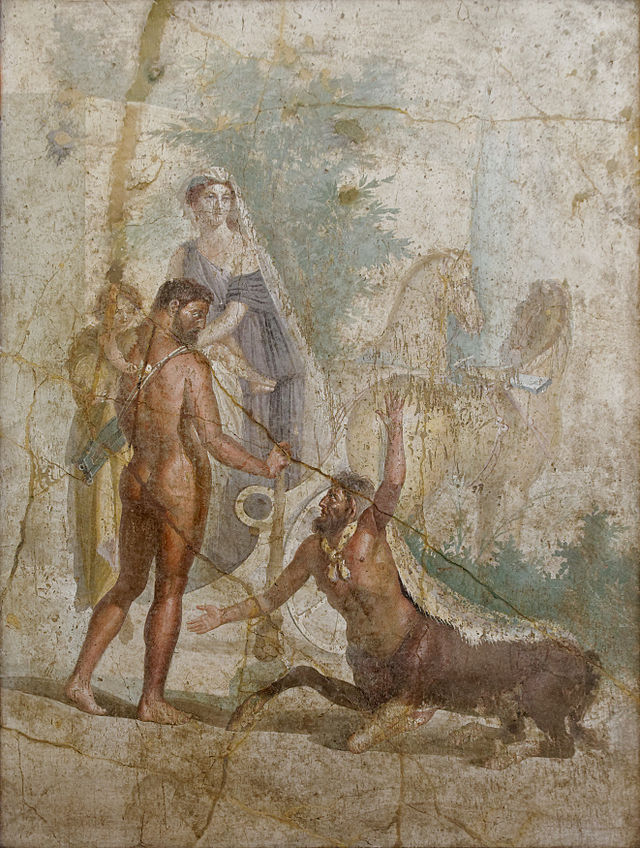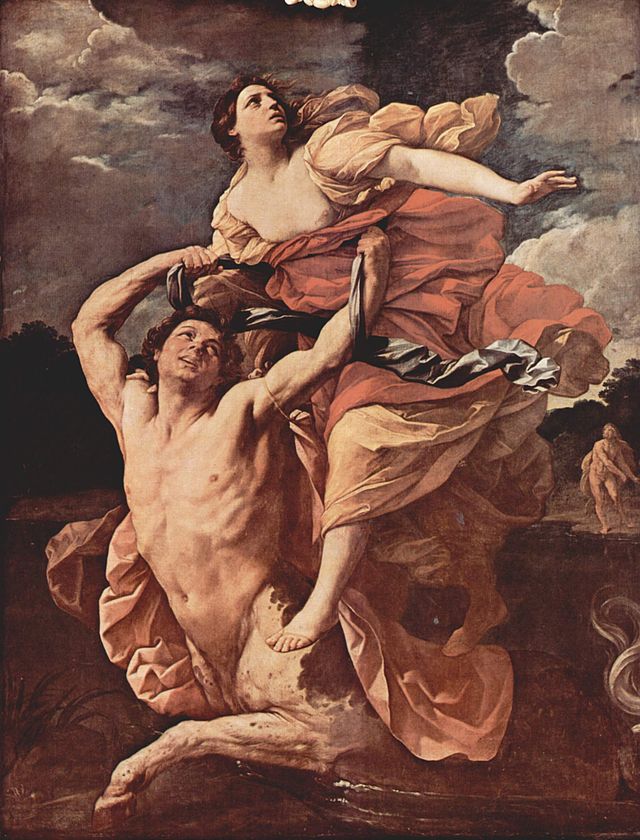Nessus (mythology)
Centaur in Greek mythology From Wikipedia, the free encyclopedia
In Greek mythology, Nessus (Ancient Greek: Νέσσος, romanized: Nessos) was a famous centaur who was killed by Heracles, and whose poisoned blood in turn killed Heracles. He was the son of Centauros. He fought in the battle with the Lapiths and became a ferryman on the river Euenos.
This article has multiple issues. Please help improve it or discuss these issues on the talk page. (Learn how and when to remove these messages)
|





Mythology
Summarize
Perspective
Nessus is known for his famous role in the story of the Tunic of Nessus. After carrying Deianeira, the wife of Heracles, across the river, he attempted to have intercourse with her. Heracles saw this from across the river and shot a Hydra-poisoned arrow into Nessus's breast. As he lay dying, as a final act of malice, Nessus told Deianeira that his blood would ensure that Heracles would be true to her forever, knowing the blood to be infected with the hydra's poison.
Deianeira foolishly believed him. Later, when her trust began to wane because of Iole, she spread the centaur's blood on a robe and gave it to her husband. Heracles went to a gathering of heroes, where his passion got the better of him. Meanwhile, Deianeira accidentally spilled a portion of the centaur's blood onto the floor. To her horror, it began to fume by the light of the rising sun.
She instantly recognized it as poison and sent her messenger to warn Heracles but it was too late. Heracles lay dying slowly and painfully as the robe burned his skin—either in actual flames or by the heat of poison. He died a noble death on a funeral pyre of oak branches. Heracles was then taken to Mount Olympus by Zeus and welcomed among the gods for his heroic exploits.[1][2][3]
A similar theme appears in certain versions of the story of Medea.
Sophocles' play Trachiniae (Women of Trachis) is extensively based on a retelling of this myth.
Before the Myth
Before the ancient Greeks told the story of Nessus and 'created' centaurs, the Kassites used them as guiding spirits.[4] There may also be a connection to the origin of centaurs in this myth. One etymological explanation for centaur stems from the meaning water-whipper, or water spirit.[5]
In popular culture
- In Dante Alighieri's Inferno, Nessus is among the centaurs who patrol the outer rings of the Circle of Violence, making sure those immersed in the Phlegethon don't get out of their position. He was appointed by Chiron to guide Dante and Virgil alongside the Phlegethon.
- Nessus appears as an antagonist in the Disney movie Hercules voiced by Jim Cummings. In the film, he is portrayed as a lecherous river guardian and is Hercules's first major opponent. Hercules defeats him in battle and saves Megara from him, but it is later revealed that Megara had been sent by Hades to recruit Nessus for his cause. Nessus appears in the video game based on the film and serves as the game's first boss, in the episode "Hercules and the Arabian Night" as Hades's chessboard piece from the animated series based on the film and in the episode "Salute to Sports" as a cameo from the TV series House of Mouse.
- One of the main characters in Larry Niven's series of books from the Ringworld universe is called Nessus. He is of an alien race with a three-legged body similar to an ostrich without feathers and two snake-like heads on long necks.
- In Gene Wolfe's novel The Book of the New Sun, the metropolis Nessus seems to be named for this character's poisoned blood, as the city had a different name back when "the river was unpoisoned."
- Nessus appears in Dante's Inferno: An Animated Epic (which is based on the video game Dante's Inferno) voiced by Charlotte Cornwell. This version is depicted as a female and is a good friend of Virgil. She helps Dante and Virgil across the Phlegethon.
- The episode is the basis for a section of T.S. Eliot's Four Quartets, Little Gidding IV, mirroring the greater theme of the poem.
Historical Allusions
The Nessus Shirt story can be connected to real world events and figures of speech. It has been used as an allusion to the early settlers giving infected blankets to Native Americans.[6]
References
Bibliography
External links
Wikiwand - on
Seamless Wikipedia browsing. On steroids.
